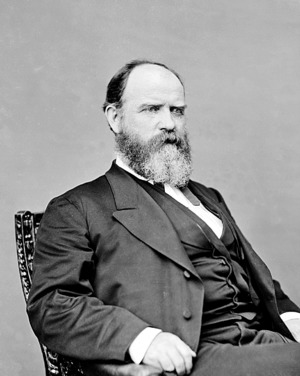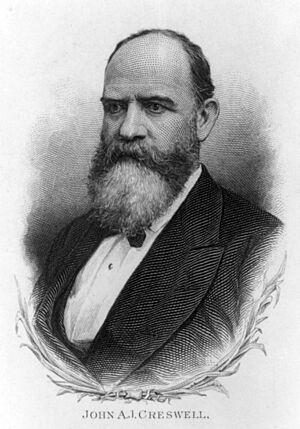John Creswell facts for kids
Quick facts for kids
John Creswell
|
|
|---|---|
 |
|
| 23rd United States Postmaster General | |
| In office March 5, 1869 – June 22, 1874 |
|
| President | Ulysses S. Grant |
| Preceded by | Alexander Randall |
| Succeeded by | James William Marshall |
| United States Senator from Maryland |
|
| In office March 9, 1865 – March 3, 1867 |
|
| Preceded by | Thomas Holliday Hicks |
| Succeeded by | George Vickers |
| Member of the U.S. House of Representatives from Maryland's 1st district |
|
| In office March 4, 1863 – March 3, 1865 |
|
| Preceded by | John W. Crisfield |
| Succeeded by | Hiram McCullough |
| Personal details | |
| Born |
John Andrew Jackson Creswell
November 18, 1828 Creswell's Ferry, Maryland, U.S. (now Port Deposit) |
| Died | December 23, 1891 (aged 63) Elkton, Maryland, U.S. |
| Political party | Whig (Before 1856) Democratic (1856–1860) Republican (1860–1891) |
| Education | Dickinson College (BA) |
John Andrew Jackson Creswell (born November 18, 1828 – died December 23, 1891) was an American politician from Maryland. He was known for being an abolitionist, meaning he was against slavery. Creswell served in important roles like a U.S. Representative and a U.S. Senator. He also became the Postmaster General of the United States under President Ulysses S. Grant.
Many people consider Creswell one of the best Postmasters General in U.S. history. He made the U.S. Postal system more modern and efficient. He also made big changes by hiring both male and female African Americans for important jobs in the postal service. This was a very progressive step for his time. Creswell introduced the first penny postcard and made mailing costs fairer for everyone.
After college, Creswell became a lawyer. He first joined the Democratic Party but later became a Republican. During the Civil War, he stayed loyal to the Union and supported President Abraham Lincoln. He was a strong supporter of ending slavery and giving civil rights to African Americans.
Contents
Early Life and Education
John A. J. Creswell was born in Port Deposit, Maryland, on November 18, 1828. At that time, the area was known as Creswells Ferry. His father, John G. Creswell, was from Maryland. His mother, Rebecca E. Webb, was from Pennsylvania.
Creswell went to a local school before attending Dickinson College. He graduated with honors in 1848. After college, he studied law for two years. He became a lawyer in Baltimore in 1850 and started his practice in Elkton, Maryland.
Political Beginnings
In the early 1850s, Creswell was a strong member of the Whig Party. When the Whig Party ended, he joined the Democratic Party. He even attended the Democratic convention in 1856.
When the Civil War began, Creswell became a dedicated Radical Republican. He strongly supported the Union. In 1861, he was elected to the Maryland House of Delegates. He worked hard to keep Maryland from joining the Confederate States. In 1863, he became Maryland's adjutant general. This meant he was in charge of gathering troops for the Union army.
Serving in Congress
Creswell was elected to the U.S. House of Representatives in 1862. He served from 1863 to 1865. He was a firm supporter of President Abraham Lincoln. Creswell was the first person in Congress to suggest a constitutional amendment to ban slavery.
Even though he lost his reelection to the House in 1864, Creswell was elected to the U.S. Senate. He filled a vacant seat and served from 1865 to 1867. In the Senate, he led the Committee on the Library. At the Republican National Convention in 1868, his name was considered for either president or vice president.
Postmaster General
After Ulysses S. Grant became president, he chose Creswell to be the Postmaster General. In this role, Creswell made many improvements to the Post Office Department. He was known as a very skilled organizer.
- He reorganized the entire department.
- He introduced the first penny postcards.
- He suggested a postal savings system.
- He cut costs while greatly increasing the number of mail routes.
- He expanded the number of postal clerks and letter carriers.
- He worked to end the franking privilege. This was a system that allowed members of Congress to send mail for free.
Creswell suddenly resigned in 1874. The exact reason for his resignation is not clear. Some historians believe it might have been due to fatigue or personal matters.
Hiring African Americans
As Postmaster General, Creswell had a lot of power to hire people for postal jobs across the country. During the Reconstruction period, Creswell, as a Radical Republican, appointed African Americans to work in the Postal System in every state. This was a very important step, as African Americans had been banned from working in the Postal Department before 1865.
Creswell appointed more African Americans than any Postmaster General before him. He made sure to hire black postmasters, even in the South. For example, in 1872, Creswell appointed Mrs. Anna M. Dumas as the first female African American postmaster in Covington, Louisiana. He also appointed James Christian of Richmond, Virginia, as the first black mail carrier in 1869. Another notable appointment was William Harvey Carney, a black Union veteran and Medal of Honor hero, as a letter carrier. Creswell also appointed Isaac Myers as the first African American postal inspector.
Abolishing the Franking Privilege
Postmaster Creswell strongly believed that the franking privilege should be stopped. This privilege allowed members of Congress to send mail for free, paid for by taxpayers. Many in Congress did not want to give up this benefit. However, President Grant supported Creswell.
On January 28, 1873, President Grant signed a law that officially ended the Congressional franking privilege. This was a big win for Creswell and helped the Post Office Department save money.
Later Career and Death
After leaving his role as Postmaster General, Creswell served as a U.S. counsel for the Alabama Claims Commission from 1874 to 1876. This commission dealt with claims for damages caused by Confederate ships built in British shipyards during the Civil War.
Creswell then returned to his law practice. He also became the president of two banks.
John Creswell died suddenly on December 23, 1891, at his home near Elkton, Maryland. He had caught the flu and then developed pneumonia. He had also been in poor health with a heart condition for several years. Creswell was buried in the Elkton Presbyterian Cemetery.
Historical Importance
Historians today see Creswell as an important but often forgotten figure. They are especially interested in his strong support for the Thirteenth Amendment, which ended slavery. They also recognize his efforts to advance African Americans, both men and women, in the Postal Service during Reconstruction.
Professor Matthew Pinsker of Dickinson College said that Creswell "helped to integrate and modernize the federal post office system. He had truly become a man of the future." Even though he was born in the South, Creswell became a strong supporter of equal opportunities for all. He was known as a very capable lawyer with great ideas for improving the Post Office Department.
Historians agree that Creswell was a "true Border State pragmatist." This means he was practical and willing to change his views. He came to embrace what were then considered radical ideas about ending slavery and promoting equality. When he joined this movement, he was a very passionate supporter.
Memorials
John Creswell has two towns named after him: Creswell, North Carolina, and Creswell, Oregon.
His large monument at Elkton Presbyterian Church Cemetery has an inscription that describes his life and achievements. It highlights his roles as a lawyer, orator, statesman, and patriot. It mentions his service in the Civil War, in the House and Senate, and as Postmaster General. The inscription praises him as an "Eloquent defender of the Union" and someone who was "Faithful to every trust."
 | James Van Der Zee |
 | Alma Thomas |
 | Ellis Wilson |
 | Margaret Taylor-Burroughs |


